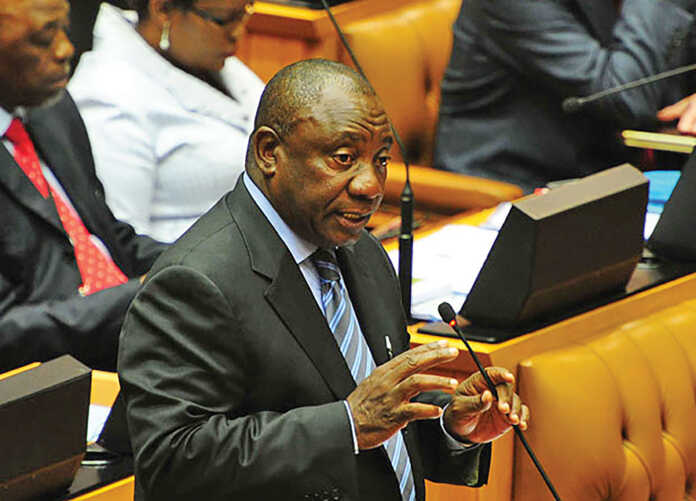President Cyril Ramaphosa is expected to take his seat in the National Assembly during a hybrid plenary for an oral reply to questions by the MPs on Thursday.
Ramaphosa will be subjected to a total of six questions covering matters of national importance including the scourge of rolling blackouts and the scrapping of the black economic empowerment (BEE) policy.
Rolling blackouts
The need for transformation and recovery of Eskom is growing as the state-owned power utility continues to crumble due to energy crises and corruption.
The administration of Eskom, which sparks controversy daily, will be placed under scrutiny again as Eskom has been faced with massive energy crises for the past 15 years and is getting worse by the year.
The crisis, alias loadshedding, does not only impact the daily lives of people and their business operations, but may also be seen as a threat capable of driving the country’s economy into a recession.
According to a question paper that Sunday World has seen, the MPs want Ramaphosa to furnish them with full details about the causes of loadshedding. In another question, the MPs seek assurance on whether the president finds Eskom boss Andre de Ruyter fit for the job. The MPs want to know whether Ramaphosa sees a need for change in leadership at the state-owned power utility.
This question emerged in previous hybrid meetings in September when Deputy President David Mabuza faced the MPs. At the time, the MPs needed clarity on how the state plans to solve the energy crises and whether it would consider privatising Eskom.
Mabuza clearly indicated that there were no plans to privatise Eskom, noting, however, that the government was on top of this matter.
“Government policies and positions have not reached a point where the privatisation of Eskom is seen as an answer,” said Mabuza.
“Our current choice is to make Eskom a more efficient and effective energy generation and transmission public entity with all the necessary capabilities to ensure the security and consistency of energy supply in the interest of our economy and human development in general.”
Mabuza said Eskom is currently in an advanced stage of the process of unbundling, noting that this will result in the transformation of the power generation sector.
“It would be inaccurate to characterise the current organisational transformation happening within Eskom as privatisation or implied intention to facilitate it.”
Mabuza also stated that the government understands the frustrations of the nation as a result of ongoing power cuts due to breakdowns of an aging fleet and power plants, noting that the state is focusing on improving maintenance and repairs to ensure increased energy availability.
After Mabuza assured the MPs that Eskom would remain a state-owned entity, the issue of administration at the entity ballooned as MPs wanted to know when De Ruyter would be removed.
The deputy president said the fate of the embattled boss lies squarely in the hands of the newly elected board of the entity. He said it is up to Eskom’s new board to decide whether De Ruyter is fit for the job or not.
Speaking about the new board, Mabuza said the government is happy that for the first time since 2018, a new board has been appointed to oversee the affairs of Eskom, noting that it consists of individuals who bring engineering, energy policy and delivery, and accounting expertise.
Mabuza said to show that the government is committed to good governance, “a competent, experienced, and capable board has been chosen to set up clear mechanisms to hold the executives accountable”.
“The board’s mandate is based on an existing shareholder agreement. It is our expectation that the board is empowered to run the affairs of Eskom in a diligent manner and adopt zero tolerance for poor performance, corruption, abuse of power, dishonesty, and conflicts of interest whenever such arise.
“This includes actions that try to undermine our efforts to build an energy utility that is financially stable and geared toward meeting its development imperative.”
Elaborating on corruption and maladministration which have been discovered at the state-owned power utility, he said Eskom does not have the required capacity in terms of intelligence, and noted that law-enforcement authorities are on standby to try and clean up the entity.
“That’s why we have sourced intelligence under police to work with Eskom. The help is starting to yield results. We are starting to arrest people.”
BEE policies
BEE, which was put in place in 1994 to facilitate broader economic participation by black people post the oppressive apartheid regime, is widely contested by critics who believe that the policy is a self-enrichment methodology favouring black people. As a result, the policy is currently seen as a failed economic strategy.
In 2021, Ramaphosa announced that the policy would be reviewed to ensure that it is not exploited.
Critics have also questioned the fairness of the policy in terms of racial classifications. During a National Council of Provinces meeting in the National Assembly in March, the MPs debated the appropriateness of the policy.
While the DA and the Freedom Front Plus called for complete scrapping of the policy, the IFP and EFF were in agreement that it had made minimal contribution to economic growth. The parties called for it to be amended instead.
This is a developing story…
Also read: Eskom boss De Ruyter’s fate lies with new board – Mabuza
No plans to privatise Eskom, says Deputy President Mabuza
Follow @SundayWorldZA on Twitter and @sundayworldza on Instagram, or like our Facebook Page, Sunday World, by clicking here for the latest breaking news in South Africa. To Subscribe to Sunday World, click here.



